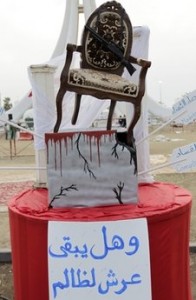MANAMA, Bahrain – A group of young protesters camped out in Bahrain’s capital Monday called for the ouster of

the entire ruling monarchy as part of sweeping demands to call off a weeklong uprising in the tiny, but strategically important Gulf nation.
The call stakes out the most uncompromising demands of protesters to date, most of whom have only called for weakening the powers of the monarchy and it was impossible to determine how much weight they have in the country as a whole.
Tensions are still high in Bahrain after seesaw battles that saw riot police open fire on protesters trying to reclaim landmark Pearl Square last week. At least eight people have been killed and hundreds injured in the clashes since the unrest spilling across the Arab world reached the Gulf last week.
Abdul Redha Mohammed Hassan, 32, who was shot in the head by security forces while trying to march to the square Friday, died in a hospital Monday, his relatives said.
Bahrain holds particular importance to Washington as the host of the U.S. Navy’s 5th Fleet, which is the main U.S. military counterweight to Iranian efforts to expand its military influence into the Gulf.
A manifesto Monday from a group calling itself “Youth of Feb. 14” — after the day of the first marches — apparently seeks to raise the stakes of demands ahead of possible talks between the opposition and the monarchy.
“We demand the overthrow of the oppressive Al Khalifa regime,” the manifesto said, referring to the ruling royal family. “The people will choose the system they will be subjected to.”
To underline their contempt for the monarchy, the protesters set up a chair resembling one belonging to a royal with a sign beneath it that says in Arabic “And does the throne of the oppressor stay?”
It was not clear what their relationship is with the official Shiite opposition that includes 18 members of the 40-member parliament who resigned in protest Thursday.
But their manifesto shows the range of demands among the opposition, from the all-or-nothing youth group to others who would let the monarchy survive but with many of its powers and privileges turned over to parliament.
The week-long unrest has already affected Bahrain’s economy. An international rating agency has cut the government’s credit ratings because of concerns about political turmoil as the crown prince was deciding on the fate of the March 13 season-opening Formula One race, the kingdom’s biggest international event it has hosted annually since 2004.
Standard & Poor’s cut the ratings Monday for Bahrain’s long and short-term sovereign credit ratings, as well as those for the island nation’s central bank and the country’s sovereign wealth fund.
Hundreds of protesters spent the night at the square, and thousands of government opponents have gathered at the site by the afternoon. The mood was upbeat and many appear to be camped there for the long haul, with makeshift kitchens serving meals to those who live in the small tent village.
At several stalls, demonstrators queued for hot tea and joked about the weather, which turned windy and whipped up sand and trash.
In the statement, the youth group called for authorities to be put on trial for attacks on protesters last week and demanded an elected government. They said the first priority should be the cancellation of citizenship for thousands of foreigners who receive it as part of an effort to change the sectarian balance in the island nation. Few policies anger Bahrain’s Shiite majority more than bestowing citizenship to outside Sunnis, mostly Arabs but also from Pakistan and other South Asian countries.
Shiites in Bahrain have often complained of discrimination by the Sunni rulers. The Al Khalifa royal dynasty has been in power for 200 years and has strong backing from other Gulf Arab leaders, who fear that Shiite powerhouse Iran could gain further footholds through the uprising led by Bahrain’s Shiites.
Bahrain’s rulers have offered talks with opposition groups to try to defuse the showdown, but the opposition appears to be in no hurry to talk with Crown Prince Sheik Salman bin Hamad Al Khalifa, who has been delegated by the king to lead the dialogue.
The leaders of the official Shiite opposition said they are not refusing to talk to the crown prince, but want guarantees the rulers’ words will be backed by action.
The main opposition demand is the resignation of the government that is responsible for this week’s bloodshed and has been led by the same prime minister — the king’s uncle — for 40 years.
Other demands include abolishing the monarchy’s privileges to set policies and appoint all key political posts, along with addressing longstanding claims of discrimination and abuses against Shiites, who represent about 70 percent of Bahrain’s 525,000 citizens.







